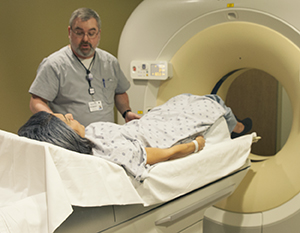Liver Biopsy
A liver biopsy is when a small piece (sample) of liver tissue is taken out of your liver. The tissue is sent to a lab. It's checked under a microscope. To do the biopsy, your healthcare provider puts a needle through your skin and into your liver. You may hear this called a percutaneous liver biopsy. In some cases, the biopsy is done by moving a thin tube through a vein into the liver area. This is called a transjugular liver biopsy. This method is less common. It may be used if you have fluid in your abdomen (ascites). Or if you have a severe risk of bleeding.
 |
| Your health care provider will give you an ultrasound or CT scan of your lower chest and upper abdominal area to help find the best site for your biopsy. |
Getting ready
Before your biopsy:
-
Have blood tests as directed.
-
Follow all directions you're given for not eating or drinking before the biopsy.
-
Arrange for someone to drive you home after your biopsy.
-
Talk with your healthcare provider if you have any questions or concerns.
Also tell your provider about all of the medicines and supplements you take. This includes:
-
Medicines, such as warfarin, that thin the blood and prevent blood clots.
-
Other medicines that thin the blood. This includes aspirin. It also includes nonsteroidal anti-inflammatory drugs (NSAIDs), such as ibuprofen and naproxen.
-
Medicines for heart conditions
-
Over-the-counter medicines
-
All prescription medicines
-
Illegal drugs
-
Herbs, vitamins, and other supplements
Stop taking aspirin and NSAIDS 1 week before the biopsy. Ask what other medicines you may need to stop. Follow any other directions from your provider.
During the procedure
-
You'll change into a hospital gown. You'll lie on your back or your left side. Part of your body is draped.
-
Your healthcare provider checks your blood pressure, pulse, breathing, and temperature.
-
Your provider may give you medicine through an IV (intravenous) line to help you relax. They'll also put medicine on your skin around the biopsy site to numb it.
-
You may have an ultrasound or CT scan of your liver. This is so your provider can find the best site to take the sample.
-
For a percutaneous liver biopsy, your provider will put a small needle through a tiny cut (incision) in your belly wall into the liver. They will take out a small sample of liver tissue. You'll be told to hold your breath while this is done. The needle is taken out.
-
For a transjugular biopsy, your provider will make a small cut in your neck. Then they will insert a small flexible tube (catheter) into your vein. The catheter is moved through the vein down to your liver. A contrast dye is put into the catheter and X-rays are taken. The dye helps the vein show up more clearly on the X-rays. Then a needle goes through the catheter to your liver. Tissue samples are removed through the tube.
-
A provider places a bandage over the incision site. For a percutaneous biopsy, they may ask you to lie on your right side for a while. A pillow or special sandbag may be used to put pressure on the incision site.
-
You'll be asked to rest. You'll be watched for a few hours after your biopsy. You can then go home if you are stable and comfortable and you have no signs of bleeding.
After the procedure
Have someone drive you home after your liver biopsy. You may feel some pain near the biopsy site or in your right shoulder. This shoulder pain is called referred pain.
When you're home:
-
Get plenty of rest.
-
Don't drink alcohol.
-
Don’t lift anything more than 15 to 20 pounds for 1 week.
-
Don’t exercise for 5 to 7 days.
-
Don't take aspirin.
-
Ask your provider when you can start taking other blood-thinning medicines as needed.
-
Follow any other directions from your provider.
Getting your results
Your biopsy results may take a few days. When the results are ready, your provider will discuss them with you.
When to call your healthcare provider
Call your provider right away if you have any of these:
-
Severe pain near the biopsy site or in your belly or chest
-
Fainting or feeling lightheaded
-
Trouble breathing
-
A fever of 100.4°F ( 38°C) or higher
-
Shaking chills
-
Feeling weak
-
Sweating
-
Bleeding from the incision site
-
Blood in your stool or black, tarry stools
-
Swollen belly
Online Medical Reviewer:
Chris Southard RN
Online Medical Reviewer:
Rita Sather RN
Online Medical Reviewer:
Sabrina Felson MD
Date Last Reviewed:
3/1/2024
© 2000-2024 The StayWell Company, LLC. All rights reserved. This information is not intended as a substitute for professional medical care. Always follow your healthcare professional's instructions.